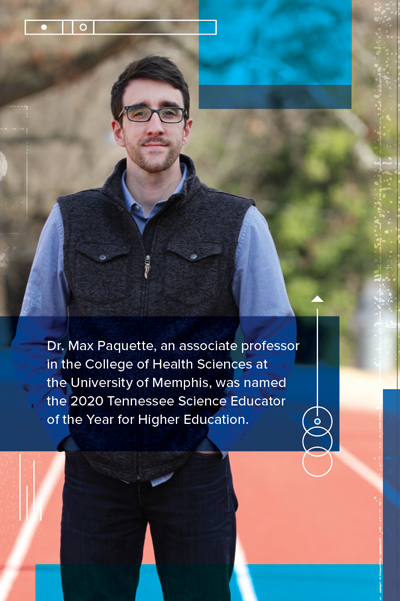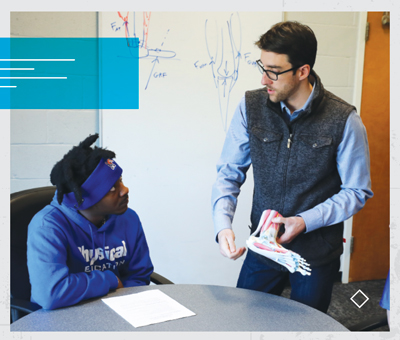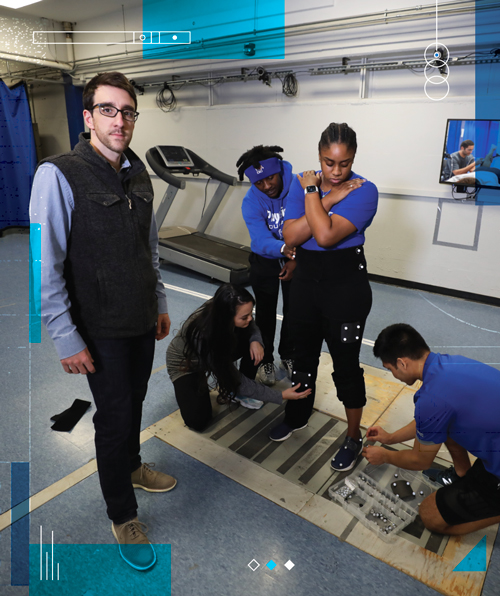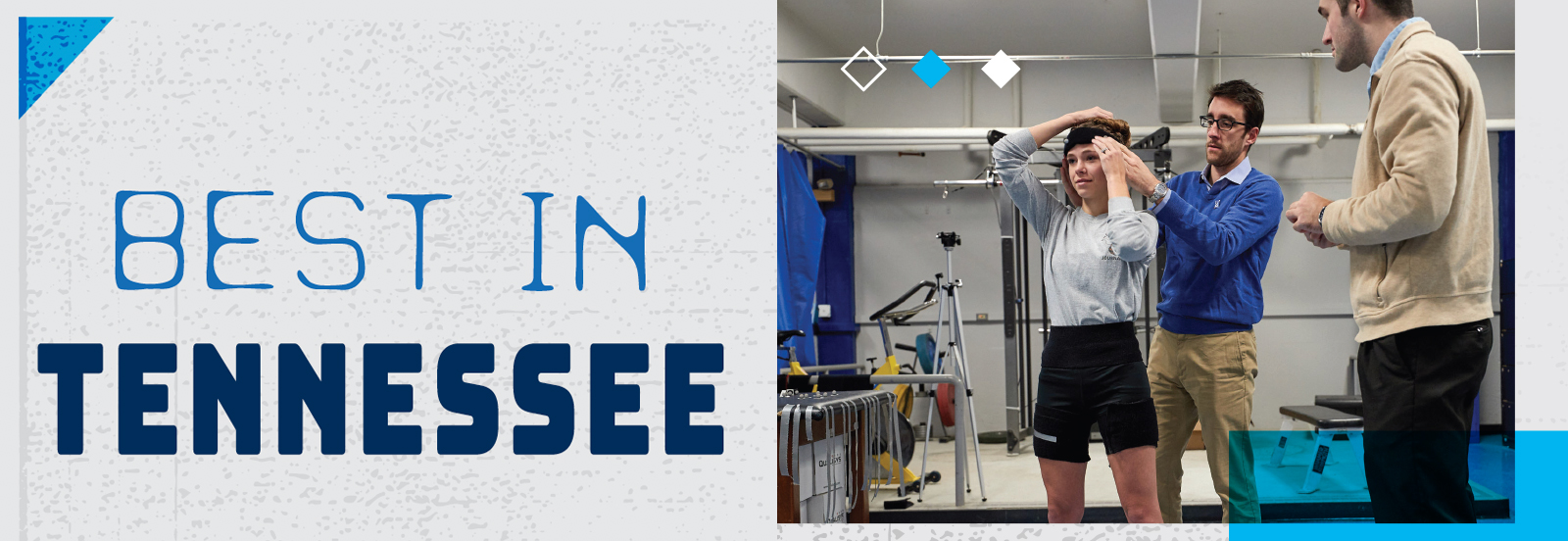Dr. Max Paquette, an associate professor in the College of Health Sciences at the University of Memphis, was named the 2020 Tennessee Science Educator of the Year for Higher Education.
 This annual award is presented by the Tennessee Science Teachers Association and recognizes
those who are leaders in promoting science and have made outstanding contributions
to science education that positively impact the community. Paquette was chosen from
a group of educators nominated by their peers.
This annual award is presented by the Tennessee Science Teachers Association and recognizes
those who are leaders in promoting science and have made outstanding contributions
to science education that positively impact the community. Paquette was chosen from
a group of educators nominated by their peers.
In addition to teaching at the UofM, Paquette is the director of the Musculoskeletal Analysis Laboratory and a biomechanist in the University’s Human Performance Center. He advises undergraduate internship and master’s students and serves on multiple doctoral dissertation committees. He also actively collaborates with researchers from institutions around the world and is a member of the American College of Sports Medicine, American Society for Biomechanics and International Society of Biomechanics.
Q: Can you describe your primary area(s) of research interest and what led you to pursue
those area(s)?
A: My research interests are largely focused on how the body (joints, segments) moves
and how these movements influence injury risks and performance in humans. I’d say
the specific topic I’m most interested in and excited about is research on how different
shoes, techniques, training exposure, age and training interventions affect injury
risks and performance in runners. I’ve been a middle-distance runner since high school
— I competed during and after college — and have now taken on more of a coaching and
sport science role in running. My own experiences as a runner and coach have been
the primary reason behind my research interest.
Q: What is your educational background and what led you to the UofM?
A: I’m originally from a small French-speaking town in Eastern Ontario in Canada, Hawkesbury,
where I went to high school. I earned a bachelor's degree in human kinetics and a
master's degree in biomechanics from the University of Guelph (Ontario, Canada). Then
I completed my doctoral studies in biomechanics/sports medicine at the University
of Tennessee, Knoxville. I was fortunate to have several professional options after
obtaining a PhD. Ultimately, the culture, departmental support and long-term plan
and vision of our current dean, Dr. Rick Bloomer, was the deciding factor for me in
choosing the University of Memphis.
Q: What did it mean to you professionally and personally to receive the Tennessee Science
Educator of the Year for Higher Education honor?
A: I don’t know that it means too much professionally, honestly. Since this award is
based mostly on support from colleagues and student evaluations, it certainly means
a lot to know that both my colleagues and students have appreciated my teaching efforts
and commitments while at the UofM. In academics, especially in a tenured position,
our worth is often rated based on scholarly outputs including external research grants
and publications and less on our teaching, mentoring and advising efforts. Although
producing new science and contributing to my area of research is important, I feel
much more fulfilled when I know I’m helping students get the most out of their educational
experience at the University. This award was a nice bonus in that it recognizes those
aspects of being an educator.
 Q: As the director of the Musculoskeletal Analysis Lab, how would you describe the mission
of the lab?
Q: As the director of the Musculoskeletal Analysis Lab, how would you describe the mission
of the lab?
A: Our lab is fortunate to have great people involved, which includes several faculty
and many graduate assistants and undergraduate internship students. The lab’s research
is generally focused on understanding human movement and performance using advanced
measurement instruments such as motion capture, force platforms and a plethora of
other research tools. Unlike many labs in the U.S., our space is shared among four
faculty members — me, Dr. Doug Powell, Dr. Larry Weiss and Dr. Daniel Greenwood. In
normal times, faculty and students are using various areas of the lab to conduct their
research and over the past decade we have been incredibly productive with about $500,000
in external funding and more than 100 peer-reviewed scientific publications in the
area of human movement. It’s been an absolute pleasure to have such great colleagues
and a chance to work within the lab. It seems we’re just getting started, and we have
lots of exciting and interesting projects in the pipeline!
Q: What are the benefits of having the Human Performance Center as a resource at the
UofM?
A: The major benefit of the HPC, led by Dr. Daniel Greenwood, is that it provides a
service that is typically only available in elite or professional sports to athletes
and coaches of all levels. The HPC staff has a breadth of expertise unparalleled across
NCAA institutions and we hope that we’ll be able to further develop what we can do
in the near future.
One of the main factors that sets us apart is the experience, expertise and creativity of Dr. Greenwood. He has worked with athletes over multiple Olympic Games cycles and across dozens of sports in Australia. He’s certainly one of a kind in the U.S. We're lucky to have him on board leading the charge.
The biggest challenge in the sport science area in the U.S. is that it’s still a relatively young field, so many coaches aren’t aware of what’s available or how to use it to help their teams and athletes. Our goal is to soon develop and obtain the resources and funding to have a standalone HPC building on or near campus and to expand our expert staff. It would be one of the only centers in the U.S. with PhD-level expertise in sport science.
 Q: In what ways are you active in your field outside of your work at the UofM?
Q: In what ways are you active in your field outside of your work at the UofM?
A: I love to be involved in projects related to running through volunteering, education
workshops, coaching and events in the Memphis area. My wife and I founded a coaching
company years ago, and we both coach local and regional runners of all levels.
I help out in any way I can with Memphis Youth Athletics, a non-profit organization that provides instructional programs and events to help develop the basic motor skills of running, jumping and throwing that are the foundation for development in any sports or fitness activity. I’ve hosted educational and outreach events for coaches and runners on topics such as injuries, training and other aspects of running performance. Since 2017, I’ve served as the elite athlete coordinator for the Ed Murphey Classic, a track and field meet for some of the world’s best athletes that includes youth and community races as well. I also serve as the athlete coordinator for the Sugar Run 5K, which has a community and professional race that serve as a fundraiser for the Juvenile Diabetes Research Foundation. My role with both events is to recruit some of the best runners around the globe to come to Memphis for a world-class competition.
Q: Is there anything else about yourself, your work, your profession or the UofM you
would like to add?
A: I think it’s important to mention that I’m a first-generation university student.
I grew up in a single-parent home with my mother and we had very little money. I was
fortunate to have great mentors, including my mom, that played an important role in
making sure I had great opportunities to experience and learn new things. The more
I did, the more confidence I gained to try and pursue things that scared me or that
were unknown. That’s mostly why I like to be involved and helped local organizations,
I know how important some of these opportunities are especially in kids that may otherwise
never get the chance to see and learn what’s out there.
Lastly, I think the UofM and the City of Memphis are absolutely amazing. Before I moved to Memphis, all I heard were negative comments about the city. I’ve since realized that the University and the City have so much to offer. If everyone does their part in our community, we will see continued growth and people will struggle to find negative things to say.

